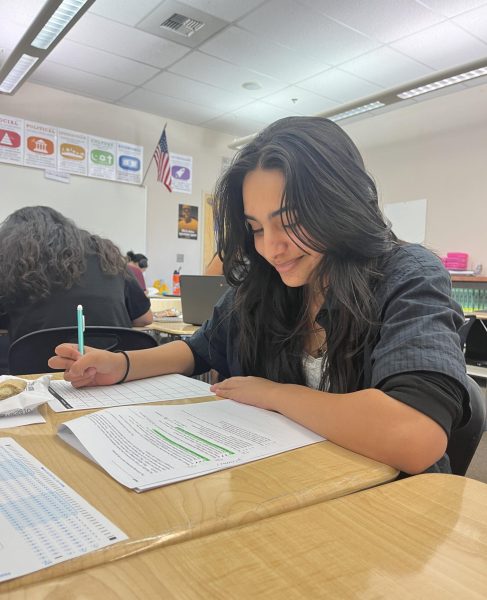What it’s like: AP Biology
During Ms. Penny Shelton’s third period AP Biology class Jan. 17, Raevin Harmon and Alexandra Smith look over their assignment sheet for the unit, which lists all the chapters they have covered. After each semester, students have the option of dropping two of their lowest test grades. Photo by Anjani Kedia
As a multi-part series, Whitney Update explores what it’s like in each Advanced Placement and Honors course to give students an accurate perspective.
Covering two chapters per week and interacting with peers to complete labs is an average schedule for a student taking AP Biology.
This fast-paced, college-level science class, taught by Ms. Penny Shelton, offers a challenging course load for juniors and seniors to ensure they are ready for the AP Exam set by the College Board. Throughout the year students expand on the “Big Ideas” of biology and draw connections between them. In order to take the class, students should have earned an A in both biology and chemistry, however students who have earned a B are still successful, according to Shelton.
“Junior and seniors that are planning to enroll in a college or university directly after high school and major in a STEM type of major should take this course to help prepare for the rigorous study skills required for these types of majors. In addition, students that have a high aptitude for science should take this class, so by earning a 3 or better will be able to earn a full year’s work of college science credit to meet their respective college’s general education requirements,” Shelton said.
With a long of list of learning objectives set forth by the College Board, the class covers the material relatively quickly, but still goes in-depth to establish a greater understanding.
An average week in the class looks like: taking notes on a specific chapter, getting lectured on it, and then being tested. In order to be efficient, Shelton offers assignments over summer break, however she still takes her students’ mental health into account.
“I only provide ‘suggested’ summer work, that helps students review the biology and chemistry concepts that are the necessary prerequisites for the course. I do not give any work over other breaks, as I know my students truly need a break from school in order to maintain proper mental health,” Shelton said.
Students currently enrolled in her class have to balance their schedule to prepare for lectures and tests.
“You definitely have to put in the time to learn the material for the test. I usually try to do the notes before the lecture and then focus on what she lectures on during the actual class,” Jeeth Pawar said.
With an average of 30 percent of students earning an A, 40 percent earning a B, and 30 percent earning an A in the class, the only way students would fail the class or earn a NC would be by not committing time or effort into learning the material, according to Shelton. However since this is an AP class, students do receive an elevated GPA.
“A student that does not have the time to commit to studying for a college level class should not take AP Biology. There is no need to ever take more than two or three AP classes in one year,” Shelton said.
The college-level material learned in the class can be challenging to understand.
“I would recommend taking this class because the information I have learned is very interesting. Also Mrs. Shelton really helps you understand the concepts,” Darian Louthan said.
This class enables students to create a strong foundation in biology and be better prepared for higher level courses. Some other benefits of this class include developing time management skills, coming up with efficient studying methods, and being able to take concepts and apply it to situations presented in labs and AP questions.








